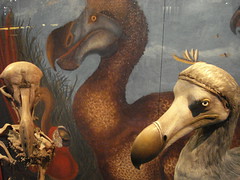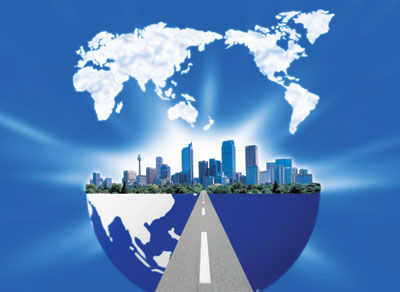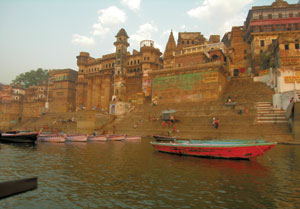- Home
- Archive -Sept 2012
- Whose Developme. . .

Whose Development is it Anyway
- In :
- Personal Growth
September 2012
By Sadhvi Bhagvati
In the rush for material prosperity, are we losing sight of precious treasures such as clean air, water, natural resources, and above all, happiness? asks Sadhvi Bhagawati
 |
As his belly rises with each deep slow breath, his frayed undershirt exposes the bare skin underneath. Brown, of course, due to genetics, but browned even more deeply due to a life in the sun. The thin plastic chair, upon which he sits, bends with his weight as he sinks deeper into afternoon slumber. His feet rest upon a bare wooden bed-frame, upon which he seats his customers during his ‘open’ hours. His head hangs loosely yet stably above his broad shoulders, and from his slightly open mouth, escape snores I can hear in my car, as I pass slowly through the village.
Around him, young children scamper about, free from the morning hours in school, starched uniforms carefully removed to be ready for tomorrow, shoes placed neatly by the door frame in which a door should exist but doesn’t. In undershirts, short pants, and bare feet they frolic about, entertained now by a branch, now by an old tyre, now by throwing rocks at the mango tree to coax mangoes to the ground.
Shortly, they will have to utilise the last hours of daylight to complete their homework, but for now, they exuberantly chase a frayed rubber tyre down the dirt road, at the end of which they will sit and suck mango juice out of freshly fallen fruit. As the afternoon sun softens and shadows begin to fall upon the road, women sweep the porches of the shops and adjacent homes, getting ready for evening customers who will come to purchase a handful of rice, a few cups of flour, or some coconut oil for their hair.
India shining?
At the end of the dirt road, our car turns right and the village disappears. Narrow, unpaved roads lined with brick and mud homes, shops carrying basic necessities, stalls of fresh fruit and vegetables, dozing men, and scampering children, give way to ‘Developed India.’ Now the street is covered with smooth black asphalt, reflecting the afternoon sun back into our eyes. There are different lanes for each direction, separated by a wide divider, in which lush greenery and flowering plants in hues of pink and purple, stand out in sharp contrast to the black of the roads.
Multi-storied modern buildings line the roads, each with its own parking lot, and separate electronic entry gate. An enormous complex is topped with a sign saying ‘Shopping Mall’, and the names of foreign stores are illuminated on the concrete wall – myriad franchises of clothing,
| Perhaps, in the rush to move forward, to break through the glass ceilings of colonisation, we have left something valuable behind | ||
jewellery, and shoe companies, from America, Italy, and London. Next to the mall, the golden arches of McDonalds shine brightly in the soot-filled sky. Both sides of the road are peppered with signs for sophisticated bars and restaurants, reminiscent of those on the Champs-Élysées, Sloan Street, or Sunset Boulevard.
The offices, bars, restaurants, and shopping malls are dwarfed, however, by what is driving the rapid development. Factory after factory complex stretches out toward the horizon in every direction, except backwards. Backwards due West lie the villages, and beyond that the forest from which the village children eat fresh mangoes, the branches of trees serving as fuel for their evening meal. Westward, backwards, is the village. Ahead are nothing but factories. Smokestack after smokestack spews out hot black air. Soon, the newly painted cream-coloured walls of the high-rise buildings will be black. Soon, only the golden arches of McDonalds will be visible in the thick black air.
Skinny, darkly tanned young men, perhaps the sons of those who are snoozing in the villages, ride bicycles on the road, on the back of which are tied heavy air conditioning units and stacks of fashionable plastic chairs. They dart between cars, their backs wet with perspiration, their loads twice the height of the bike, and more than ten times the weight.
Men and women in their 20s and 30s rush in and out of the cars parked in the lots. They are dressed in Western business attire, suits and ties for the men, long skirts and tops (or an occasional tailored salwar kameez), for the women. They carry briefcases and clipboards. Over the women’s shoulders hang heavy handbags bearing designer names. They buzz about, from the cars into the doors of the offices, out of the office doors, into the cars, up the road to McDonalds, or the bar, perhaps to the shopping mall. As they cross the road, rushing from one meeting to another or from their parked car to an office, the afternoon sun casts shadows on the wrinkles in their faces. Their grimaces have become etched into the very fabric of their skin. Occasionally, they cover their mouths with silk handkerchiefs as they cough and wheeze in the unbridled pollution. They smile, perhaps, in the evenings over a beer or bottle of wine.
 Pollution has ravaged the holy Ganges which is called the lifestream of Indians Pollution has ravaged the holy Ganges which is called the lifestream of Indians |
The row after row of factories, toxins gushing into the air, multi-storied buildings with central air conditioning, drive-through McDonalds, restaurants where one can leisurely sip a beer or wine or whisky with dinner, is ‘Developed India.’ Women in short skirts and heels, men in black suits on a summer day, sky-high stacks of plastic chairs, take-away styrofoam containers, block-length shopping malls, products after products to quench people’s thirst for happiness. Surely, at the end of a particularly busy day or week or month, these women and men will rush into the toy store to buy a new Sony PlayStation for their children, assuaging their ephemeral regret at not having time to spend at home. Their children will sit in front of a computer screen, PlayStation controls in one hand, bag of potato chips in the other, and numb their longing for a hug.
Is it development?
What is development? What is progress? By what specific measures do we say that we have moved ‘forward’ from the peacefully dozing grocer? Are the children with the PlayStation, who will inevitably clamour for newer and newer models, truly more ‘privileged’ than the ones able to spend the afternoon happily chasing a car tyre down the dirt road, or knocking mangoes out of trees? Has chopping down the forest to build factories that produce not only commercial products but also toxic waste, pollution, cancer and global warming really benefited our country? When we say ‘development,’ what exactly is it that we have ‘developed?’ Immunity to thick black air pollution until it turns cancerous in our lungs? Dependency upon goods packaged in inordinate amounts of plastic? Ignorance of the futility of trying to fill inner, intangible emptiness with material possessions? Blindness to the violence inherent in the production of meat? Distance between us and our families, between us and God, between us and our true selves? What, really, have we developed?
Yesteryear India
When I first came to India one of the most remarkable aspects to me of the culture and the country was the peace on people’s faces – the rich, the poor, the old, the young, the homeless, the hungry, the educated, and the illiterate. It was as though one’s lot in life was simply part of the ‘package deal’ of human birth, and was something to be borne. It had little connection to one’s sense of self or self-worth. Even those who lived far below western standards of abject poverty were eager to share. “Please come home for dinner,” I heard countless times from people who could not even afford to feed their own families, let alone an extra mouth.
Cost of consumerism
In 15 years, much has changed. Perhaps bombarded by Western and Westernised serials, movies, fashion magazines, and cultural indoctrination, the ‘New India’ has started judging its self-worth much like the West does – by the balance in their bank account, the number of shopping bags on their arms, the brand of sunglasses upon their faces, and the size of their waist. There is a feverish clamouring for more and more, better and better, newer and newer. India has become a country where there are nearly twice as many mobile phones as toilets.
India’s image of itself has shifted significantly. Where emphasis previously had been on development and production of intelligence, of knowledge, of science and technology, it has now shifted to development and production of marketable goods. Not goods that India is traditionally famous for – not silk, woven fabrics, artwork, Ayurvedic medicines, herbs and spices – but generic goods, goods that are a symbol of the rapidly burgeoning middle class such as motorcycles, tyres, plastic containers, mobiles, leather handbags.
An inevitable and inextricable part of production is waste. There is a direct, linear relationship between the volume of goods produced by a factory, and the volume of waste cast by that factory into local rivers, lakes, and groundwater, or spewed into the air. As India rushes exuberantly toward unbridled consumerism, she must be prepared for a rapid devastation of her air and water quality.
This tragic prophecy is already a fact of not only the future, but of the present. More than two-thirds of people living in the eastern Ganga river basin, suffer from water-borne illnesses. More than three million people die annually as a direct result of the toxic, commercial, industrial and wastewater pollutants that are dumped – more than 1.3 billion litres per day – into her waters. As we clamour for more and more, newer and newer, as we continue to associate our self-worth with the knick-knacks on our counters, using TVs and computers as baby-sitters, we are rendering our natural environment unlivable. Ganga pays the price
“It’s the government’s fault,” people shout out of habit. “The administration has already allocated billions of rupees to the ‘Clean-Up Ganga’ programme. What has happened to it?” However, the problem is not nearly as simple or unilateral as it may seem. Sure, basic infrastructural issues such as sewage, solid waste, and garbage collection, should certainly be taken care of by local and state municipalities. However, we all have a serious role to play as well – both in the problem and the solution.
While untreated sewage cascades from drains and gutters into Ganga, this is far from the only problem she faces. The hundreds of factories lining her banks produce 260 million litres of toxic waste per day that fill her waters, poisoning not only the fish and dolphins that live in her waters, but also the 450 million Indians who depend upon these waters for their very lives – their water for drinking, bathing, cooking, and agriculture. The commercial and industrial effluents are suffocating the sacred river, squeezing the life out of her waters, and all species, which inhabit them.
Every new product we purchase, every gram of plastic packaging, our leather car seats, purses and shoes produced in these factories, have a direct impact on the levels of toxins in Ganga, and therefore upon the health of our brothers and sisters who live downstream. The exorbitant amount of electricity required to run the factories at warp-speed, all hours of the day and night, necessitates construction of dams on the river. These dams, functioning as ‘Run-of-the-River’ projects, diverting water out of the riverbed, further diminish the volume of water available to dilute the toxins. It is a tragic lose-lose situation, a cycle of violence – violence to Ganga and violence to those whose lives depend upon her waters being clean and free flowing.
Should we go back?
Development is necessary. One cannot move backwards in time. Children raised on a PlayStation should not be forced to try to amuse themselves with a tyre. Progress in the fields of education, technology, science, and manufacturing, are fabulous boons for any society, and particularly Indian society, which was oppressed for so many years prior to Independence. However, freedom should not be interpreted as a licence for decadence or gluttony at the expense of others. As tempting as it is to revel in new wealth and newly available items, options and variety, we must strive to do so with a long-term view in mind. A revered saint once said, “Your freedom ends where my toes begin.” If our freedom of purchase is turning the water, which hundreds of millions depend upon for life, into toxic sludge, then perhaps it is time to re-evaluate the expression of our freedom. If our freedom of extravagance threatens to ravage the river revered as Mother Goddess by more than a billion people, and upon whose banks millions perform daily ablutions, then are we not infringing upon the freedom of others?
Is there a balance?
The issue of balance and sacrifice is a sensitive one. People with the economic ability to spend wantonly, would not like their freedom to be curtailed. However, we no longer can pretend that we live in a vacuum. What I purchase here, is affecting the lives of those over there. I am not suggesting bans or even taxes or disincentives for purchasing. I am simply suggesting that perhaps as a society we can re-evaluate our understanding of the idea of freedom, wealth, and development.
Perhaps the man who can sleep soundly in the middle of the day, with a village bustling around him is wealthier in some meaningful way, than those who need pills or a few glasses of wine or even the lull of a TV to fall asleep in their posh bedrooms at midnight. Perhaps, in the rapid rush to move forward, to break through the glass ceilings of centuries of colonisation, we have left something valuable behind. Perhaps, that which we have left behind may benefit not only ourselves personally, but the country we call Bharat Mata. Perhaps the answer to some of what ails us, our environment, our sacred rivers, and hundreds of millions of our brothers and sisters, can be found not by pushing further forward, but perhaps by pausing and looking back, to see if we didn’t drop something along the way.
To read more such articles on personal growth, inspirations and positivity, subscribe to our digital magazine at subscribe here
Life Positive follows a stringent review publishing mechanism. Every review received undergoes -
- 1. A mobile number and email ID verification check
- 2. Analysis by our seeker happiness team to double check for authenticity
- 3. Cross-checking, if required, by speaking to the seeker posting the review
Only after we're satisfied about the authenticity of a review is it allowed to go live on our website
Our award winning customer care team is available from 9 a.m to 9 p.m everyday
The Life Positive seal of trust implies:-
-
Standards guarantee:
All our healers and therapists undergo training and/or certification from authorized bodies before becoming professionals. They have a minimum professional experience of one year
-
Genuineness guarantee:
All our healers and therapists are genuinely passionate about doing service. They do their very best to help seekers (patients) live better lives.
-
Payment security:
All payments made to our healers are secure up to the point wherein if any session is paid for, it will be honoured dutifully and delivered promptly
-
Anonymity guarantee:
Every seekers (patients) details will always remain 100% confidential and will never be disclosed
